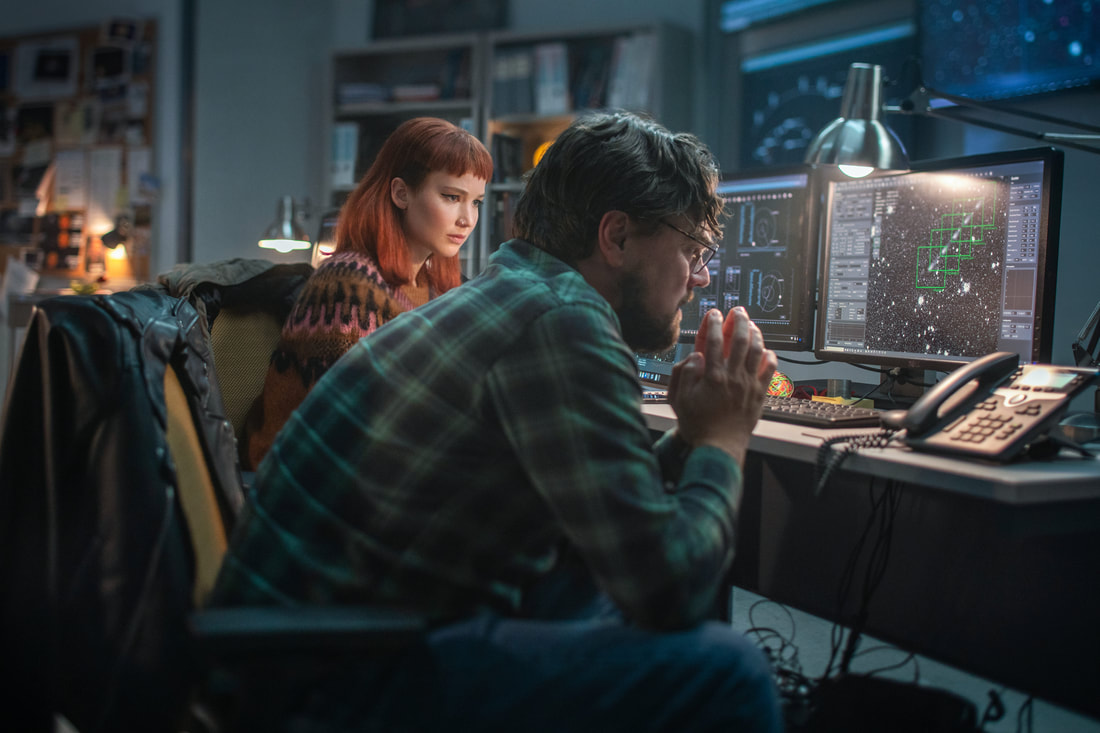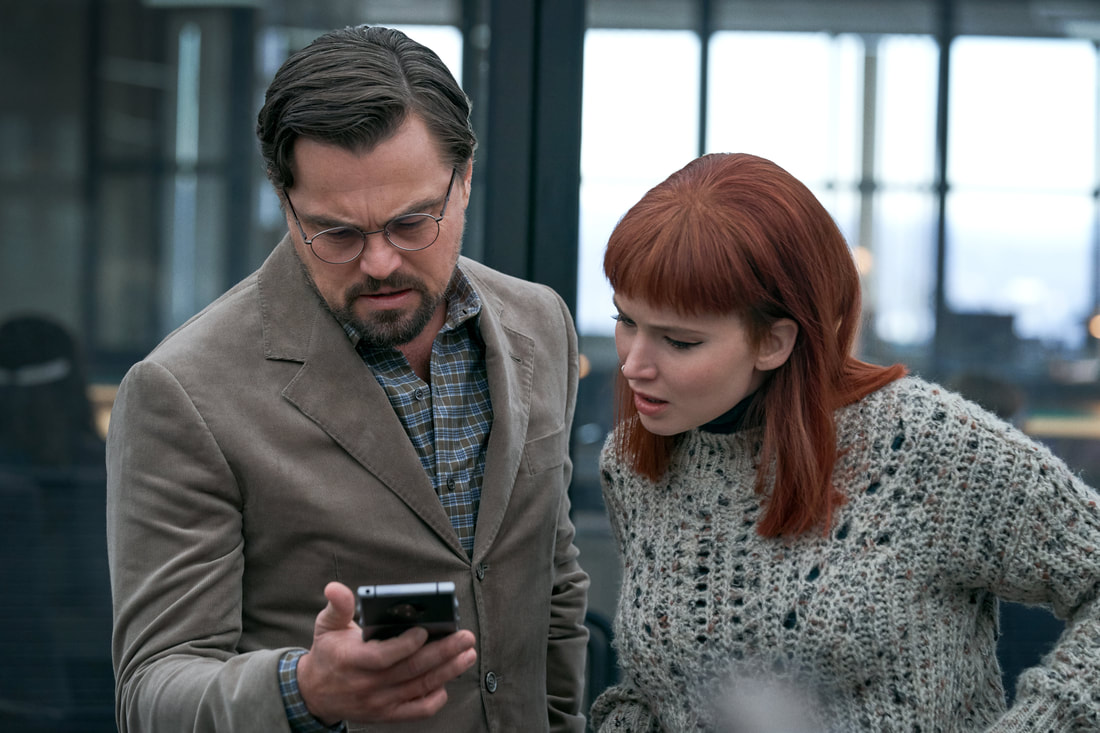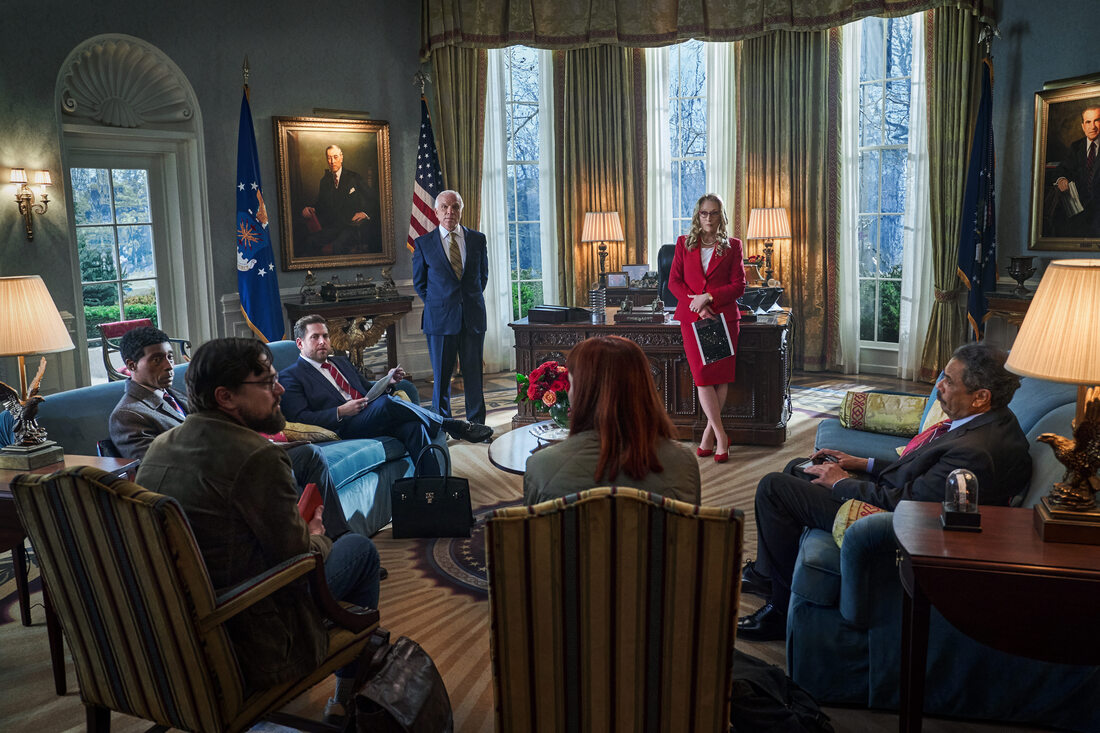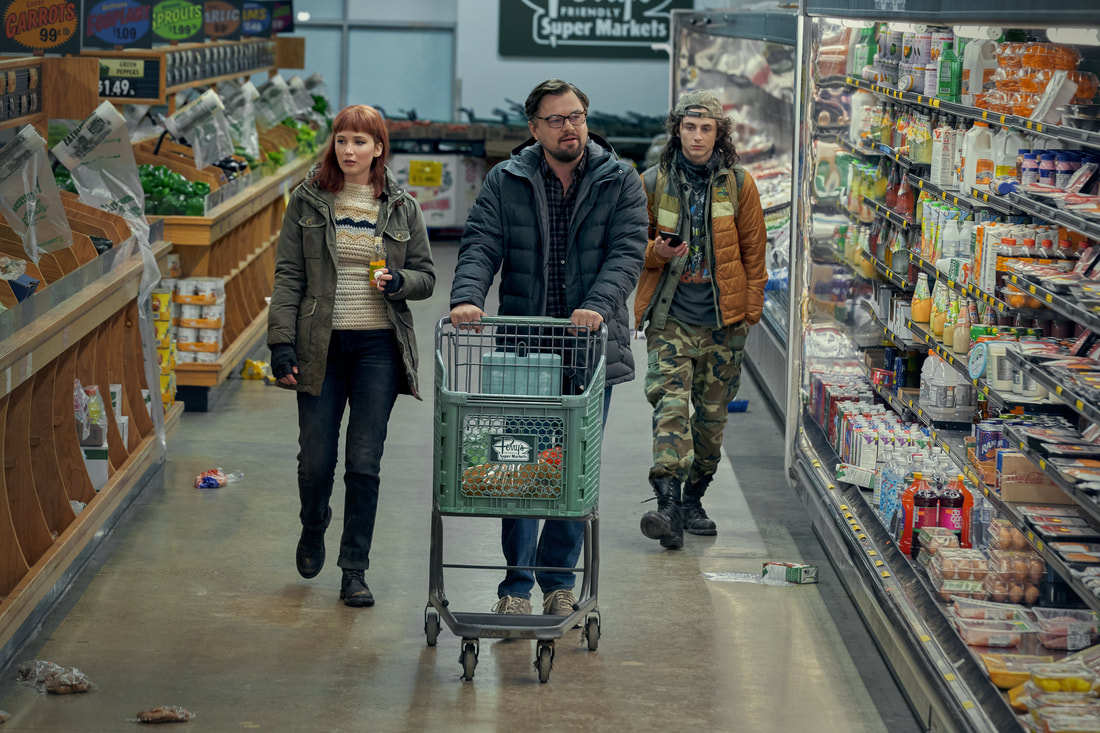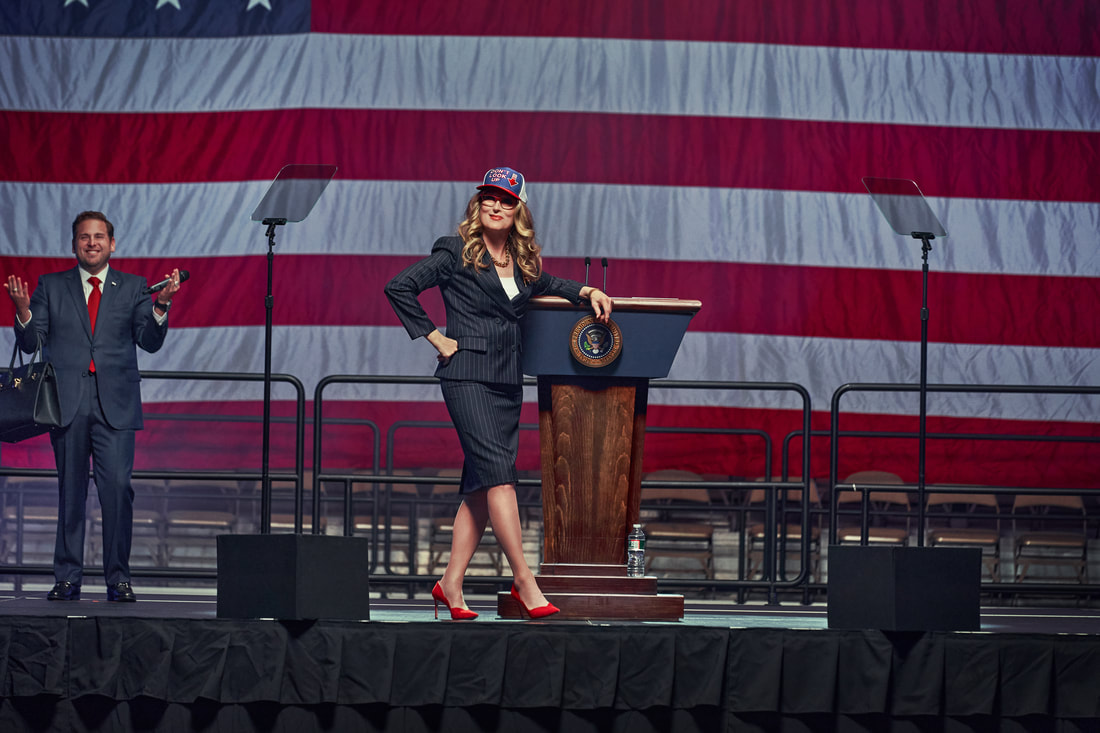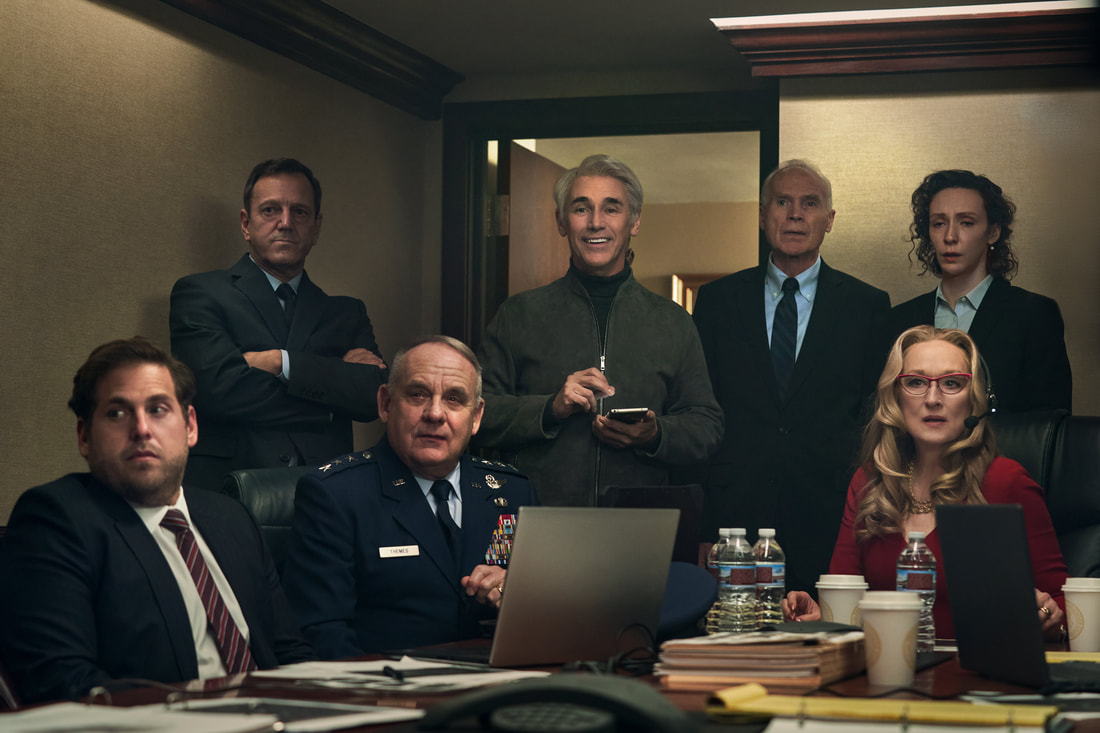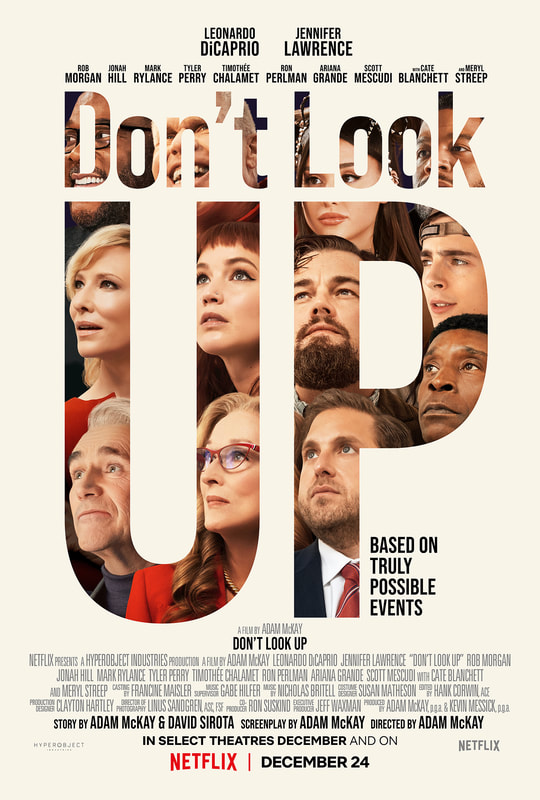|
Kate Dibiasky (Jennifer Lawrence) begins her morning like any other. She makes a cup of tea, curses at herself as she prepares her jam and toast, pops in her earbuds, and plants herself in the observatory at Michigan State. But as she looks out at the stars, she notices something strange, out of place, and beautiful: a comet, fierce and fiery, making its way across the solar system. For a brief moment, Kate experiences the joy of genuine discovery. She’s soon joined in the observatory by her fellow PhD candidates and their mentor, astronomy professor Randall Mindy (Leonardo DiCaprio). But after conducting a few calculations, Kate and Randall come to a stomach-churning realization about the comet. Thus begins Don’t Look Up, an anxiety-driven dark comedy about the end of the world. The apocalyptic dramedy was written and directed by Adam McKay (Vice, The Big Short, The Other Guys) with a story by David Sirota. Lawrence and DiCaprio are joined by a multi-million dollar cast that includes Timothée Chalamet, Cate Blanchett, Meryl Streep, Jonah Hill, Ron Perlman, Ariana Grande, Mark Rylance, Tyler Perry, Rob Morgan, and Kid Cudi. Perhaps a movie about getting people’s attention warrants such a star-studded cast — for as Kate and Randall learn, measly Midwestern nobodies aren’t very good at sparking a national movement. After reporting the comet to NASA, Kate and Randall are whisked off to Washington where they present their findings to President Orlean (Streep). But the President of the United States is more concerned about the midterms than the end of the world, and what should be a straightforward humanitarian problem turns into a political nightmare of COVID-era proportions. As the tagline says, Don’t Look Up is based on truly possible events. McKay makes no attempt to soften his message, blatantly criticizing the politicization of a global disaster and the media’s role in dividing the nation. But he calls out both sides, creating a condemning dark comedy that will make your heart race. McKay’s writing is good. But at a technical level, it isn’t particularly witty or original (how long do you think it took him to come up with the little speech where Jonah Hill’s character addresses the people of the world by saying a prayer for “all the stuff” that will be destroyed by the comet?) And yet, Don’t Look Up is laugh-out-loud funny. So what makes it work? For starters, there’s the excellent cast, which gives Don’t Look Up a crowd-pleasing comedic profile that ranges from dark, sophisticated humor to crude immature banter. Jennifer Lawrence especially adds a distinct kind of apathetic comedy to the film that will resonate with a gen-z audience. But Lawrence also knows how to do emotional — and she knows how to do it right. Her character, Kate, isn’t just a jaded progressive young person who’s given up on humanity. She’s genuinely concerned about the fate of the world, and she wears her heart on her sleeve through every high and low of this wild rollercoaster of a movie. She speaks for a generation of young people who are trying to enjoy normal adolescent experiences while coming of age during a once-in-a-lifetime global catastrophe. Jonah Hill, on the other hand, who plays the president’s son and chief of staff, fills the screen with his signature boyish confidence. His near constant sarcasm and natural comedic timing add a layer of lighthearted fun to an otherwise anxiety-inducing dark comedy. Then, there’s the talented Mark Rylance, who isn’t the obvious choice for a humorous role alongside comedy veterans like Hill and Tyler Perry. But his satirical and creepy portrayal of an antisocial silicon-valley billionaire adds yet another flavor of humor to the film, taking its wackiness to a whole new level. With these (and other) solid performances in place, Don’t Look Up also works so well because McKay has such an innate sense of comedic timing. He doesn’t necessarily need an original joke to put his audience in stitches. He just has to find the right performer and put the shots in the right order, and he’s got a winning comedy on his hands. McKay knows how to use juxtaposition and the unexpected to make his audience crack up, and his clever style is what makes Don’t Look Up so much fun. While the movie could have done without so many cliché documentary-style clips depicting nature and world cultures (it’s nearly two and a half hours long, so surely something could have been cut), the overall structure of the film and the relationship between individual sequences works out quite nicely. Although its length would suggest otherwise, Don’t Look Up is a movie that comes right out and says what it needs to say without any nuance or subtlety. McKay doesn’t try to disguise his cultural/political references one bit. From the red MAGA-style baseball caps worn by President Orlean’s supporters to the protest/looting scene, Don’t Look Up is full of blatant references to the events of the past two years. It’s a movie made for and about COVID-era, post-Trump America. At times, all those on-the-nose references get a bit tiring — but the humor, style, and performances in Don’t Look Up make its overly direct political messages work. But what starts as simple political criticism turns into an all-out nihilistic mind-melt that criticizes both sides of the political spectrum and rejects nearly every possible response to global catastrophe as self-interested and futile. President Orlean is too self-involved, Kate is too explosive and violent, the media is too dismissive, and the masses are too easily swayed. But even as Don’t Look Up criticizes our media-driven world, the movie is necessarily a part of that madness. It’s a form of capitalistic mass media that uses an all-star, award-grabbing cast to send a politically charged message. At the climax of the action, it seems as though Don’t Look Up has nothing hopeful to offer (except perhaps its general wackiness and entertainment value). But then, Don’t Look Up somehow rounds itself out with a surprisingly profound ending (don’t worry, I won’t spoil it for you here). In order to get to its uplifting endpoint, it first has to destroy our idea of what hope is. Hope, to most, means finding a solution. Hope, to most, is a way to sidestep the end of times. But Don’t Look Up presents a situation in which there is no easy solution and in which both sides of the political spectrum are wrong. Instead of offering the answers we’re looking for, it points us toward gratitude. It shows us that even in the face of global chaos, meaning can be found in memory, in friendship, and in thankfulness. Don’t Look Up depicts hope as a conscious and constant choice to seek harmony with those around us. Indeed, Don’t Look Up is a movie made in, by, and about COVID-era America. And despite its dark, jaded humor, it has something important to say.
0 Comments
Leave a Reply. |
"Our embodied spectator, possibly perverse in her fantasies and diverse in her experience, possesses agency...finally, she must now be held accountable for it." Categories
All
|

